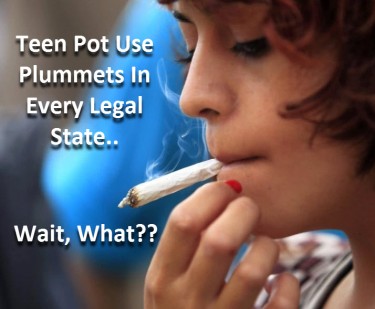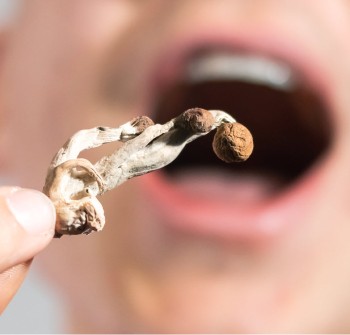
The Kids are Alright (Updated)
For years, opponents of cannabis legalization have wielded a powerful argument: "Think of the children!"
We've been warned that legalizing cannabis would send the wrong message to kids and lead to increased use among our youth. These dire predictions have been a cornerstone of prohibitionist rhetoric, playing on the fears of parents and policymakers alike.
But now, over a decade into the legalization experiment in states like Colorado and Washington, we have something far more valuable than speculative fears – we have data. And that data tells a story that might surprise many.
Contrary to the gloomy forecasts, the latest findings from Colorado paint a picture that should make both cannabis advocates and concerned parents take notice. It turns out that legalizing and regulating cannabis might actually be the best approach for protecting our children.
In this article, we'll dive into the surprising statistics that show a significant decrease in cannabis use among Colorado's youth since legalization. We'll explore the reasons behind this counterintuitive trend and examine why a regulated, legal cannabis market could be more effective at safeguarding our kids than prohibition ever was.
For those who consider themselves conservatives or who prioritize children's health, prepare to challenge your assumptions. The evidence suggests that when it comes to cannabis and kids, legalization might just be the responsible choice. Let's look at the facts and consider what they mean for the future of drug policy and youth protection.
Real Data in the Real World
When it comes to the impact of cannabis legalization on youth consumption, we now have concrete data to analyze, and the results are eye-opening. Let's look at the facts:
Colorado's Surprising Trend: The latest Healthy Kids Colorado Survey provides compelling evidence that legalization hasn't led to increased youth use. In fact, it's shown the opposite:
-
From 2013 to 2023, the proportion of high school students reporting marijuana use in the past month dropped by a substantial 37%.
-
During the same period, the number of teens who found marijuana "easy" to obtain decreased by 27%.
These statistics are particularly significant given that Colorado, along with Washington, was one of the first states to legalize recreational marijuana in 2012, with retail sales beginning in 2014.
A National Trend:
Importantly, this downward trend in youth cannabis use isn't isolated to Colorado. According to the Centers for Disease Control and Prevention, high school marijuana use has decreased by an estimated 30% nationwide over the last decade. This suggests that the positive effects of legalization and regulation may be felt beyond state borders.
Scientific Backing:
In April 2023, a comprehensive study published in JAMA Pediatrics provided further evidence supporting the benefits of legalization. The study, which included data from nearly a million teens across 47 states, found that legalizing marijuana - including allowing licensed marijuana stores - is associated with reduced use rates among teenagers.
The study stated, "[Legalizing recreational marijuana] was not associated with adolescents' likelihood or frequency of cannabis use, although negative total effect estimates indicated significantly lowered use following RCL [recreational cannabis laws]."
This research considered not just cannabis use, but also tracked "prior month use of cannabis, alcohol, cigarettes, and e-cigarettes," providing a holistic view of substance use trends among youth.
Furthermore, compliance checks in states with legal markets, such as California, Colorado, and Nevada, have shown that licensed marijuana retailers consistently refuse to sell to underage individuals. This suggests that a regulated market may be more effective at restricting youth access than the black market that thrives under prohibition.
These findings challenge the long-held assumption that legalization would lead to increased youth use. Instead, they present a compelling case that a regulated, legal cannabis market may be more effective at protecting our youth than prohibition ever was.
Why the Kids Aren't Using Cannabis
The declining rates of cannabis use among youth in legalized states might seem counterintuitive at first, but there are several logical reasons behind this trend:
-
Stricter Access Control: Contrary to prohibitionist fears, legalization has made it harder for minors to obtain cannabis. Licensed dispensaries rigorously check IDs and face severe penalties for selling to underage customers. In contrast, street dealers under prohibition have no such constraints. This shift from unregulated to regulated sales has effectively reduced youth access.
-
Loss of Rebellious Appeal: Before legalization, using cannabis was often seen as an act of defiance against an oppressive system. Now that it's mainstream and legal for adults, it has lost much of its counter-culture allure. For many teens, cannabis use is no longer a way to rebel against authority.
-
Clear Distinction Between Adult and Youth Use: Legalization has created a clear demarcation between adult and youth cannabis use. This separation, similar to alcohol, helps reinforce the idea that cannabis is for adults, potentially making it less appealing to teenagers who want to assert their independence.
-
Evidence-Based Prevention Campaigns: Legal cannabis markets often allocate funds for prevention campaigns. Unlike the often-criticized D.A.R.E. programs of the past, these new initiatives tend to be based on factual data rather than fearmongering. This honest, science-based approach resonates better with young people and can be more effective in preventing underage use.
-
Focus on Harm Reduction: Legalization frameworks typically include comprehensive strategies for risk reduction and regulation. This approach demonstrates a genuine concern for public health, including youth well-being. In contrast, prohibition often focuses more on punishment than on protecting vulnerable populations.
-
Improved Family Dialogues: With cannabis becoming a more open topic of discussion, parents may find it easier to have honest conversations with their children about its use and potential risks. This open dialogue can be more effective than the secretive or confrontational approaches often necessitated by prohibition.
-
Reallocation of Law Enforcement Resources: Legalization allows law enforcement to focus more on preventing sales to minors and other protective measures, rather than blanket criminalization that often inadvertently puts more cannabis in the hands of youth.
In light of these factors, it becomes clear that a regulated, legal cannabis market is more aligned with protecting our youth than prohibition ever was. The data-driven, health-focused approach of legalization is proving to be the truly "pro-kid" position.
Prohibition, with its focus on criminalization rather than education and its inadvertent empowerment of unregulated markets, is increasingly revealed as the "anti-kids" stance. As we continue to gather data and refine our approaches, it's becoming evident that if we truly want to protect our children, embracing sensible regulation is the way forward.
The Sticky Bottom Line
The Sticky Bottomline
As we've seen, the question "What about the children?" - long wielded as a weapon by prohibitionists - has found its answer in an unexpected place: legalization. The data is clear: regulated cannabis markets are proving to be the most effective way to keep our kids safe. But why stop at cannabis?
Extending this logic to all drugs could potentially yield similar positive outcomes. It's time we face reality: people use drugs. Whether it's coffee to start the day, a glass of wine to unwind, cannabis to relax, or even psychedelics for personal growth - drug use is a part of the human experience.
As a society, we need to grow up and accept this truth. The right of consenting adults to make decisions about their own minds and bodies is fundamental to personal freedom. Without this right, we're not truly free; we're merely property of the state, modern slaves to outdated and harmful policies.
Legalization isn't about promoting drug use; it's about creating safer environments, fostering honest dialogues, and implementing effective regulations. It's about treating drug use as a health issue rather than a criminal one. It's about protecting our youth through education and controlled access, not through fear and punishment.
So, when we hear the age-old cry of "What about the children?", we can now confidently respond: Legalize. Regulate. Educate. This approach has proven to be the most effective way to protect our youth, foster a healthier society, and uphold the principles of individual liberty. The sticky bottomline is clear: legalization is not just a choice, it's a responsibility we owe to our children and to ourselves.







